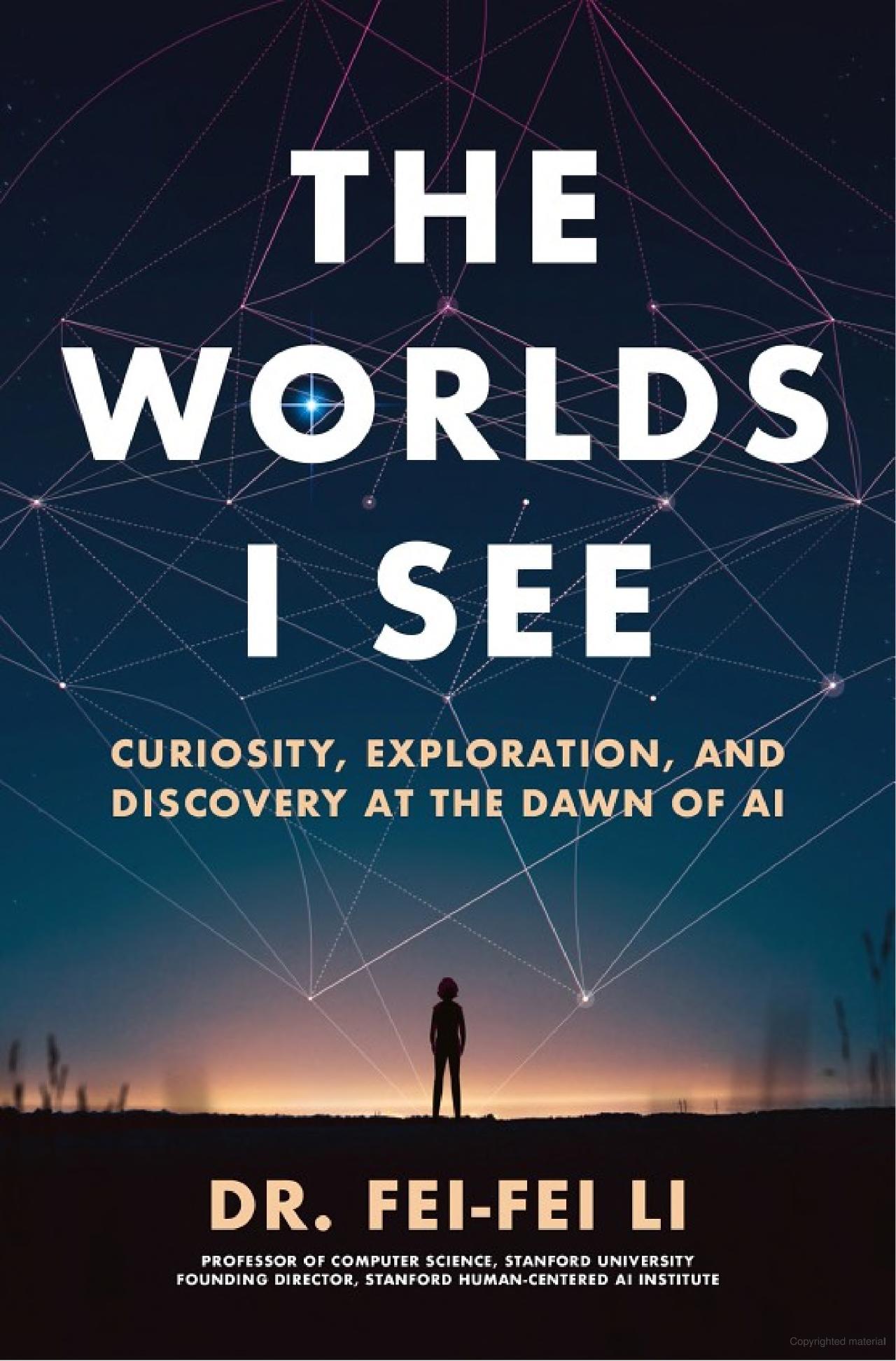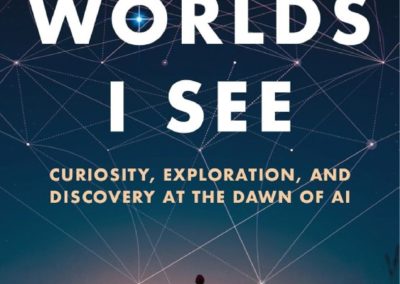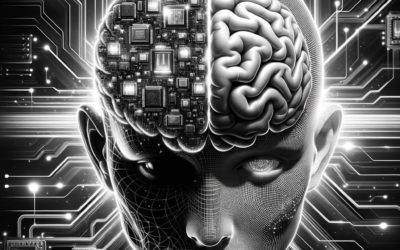Dr. Fei-Fei Li: The worlds I see Curiosity, Exploration and Discovery at the Dawn of AI
Dr. Fei-Fei Li is one of the academics very much at the centre of developments in human centered AI in the last 15 years. She is currently a Professor of Computer Science at Stanford University. She is probably best known for her work on Imagenet (https://www.image-net.org/) while at Princeton University (she developed a large-scale, structured database used to improve object recognition algorithms – core to development of deep learning solutions in AI).
The book neatly intertwines three themes: the immigrant story of the young Chinese girl and her parents making their way in the US, the emergence of artificial intelligence from the 1950s through to the present day and Dr. Fei-Fei Li’s own role in and contribution to human centered artificial intelligence.
Human centered revolution
The book opens with her arriving to testify at the House Committee on Science, Space, and Technology on the topic of artificial intelligence, June 16, 2018. Her own thoughts ahead of the Committee were: ‘I had one idea to share today, and I repeated it in my thoughts like a mantra. It matters what motivates the development of AI, in both science and industry, and I believe that motivation must explicitly center on human benefit’. And she was clear on the scale of change: ‘I believe our civilization stands on the cusp of a technological revolution with the power to reshape life as we know it… This revolution must, therefore, be unequivocally human-centered’
Immigrant story
The immigrant story is yet another reminder of the contributions made by immigrants in all societies. And she has a number of interesting insights. ‘What made the work draining was the uncertainty that hangs over the immigrant experience. I was surrounded by disciplined, hardworking people, all of whom had stories like mine, but none who’d escaped the cycle of scarcity and menial labor to which we seemed consigned. We’d come to this country in the hopes of pursuing opportunities that didn’t exist elsewhere, but I couldn’t see a path leading anywhere near them. As demoralizing as our circumstances could be, however, the lack of encouragement within our community was often worse’.
She recalls one case of an immigrant being assaulted and her own helplessness to assist: ‘I wanted to say something, even if it was nothing more than a single-word plea for the violence to stop, but I noticed something strange: in the confusion of the moment, I didn’t know which language to use’
The immigrant story also has so many positives – the openness of teachers, the opportunities, the huge support and encouragement of one teacher and his family, her parents getting going in work. ‘There were moments that I had to step back and simply watch. These were the people I grew up with in China: strong, resourceful, impressive. It’d been far too long since I’d seen them. I was proud to witness their return’.
Development of AI
The history of developments in artificial intelligence is well documented in many places. But Fei-Fei Li captures the momentum and the hiatuses – from Turing (“Instead of trying to produce a programme to simulate the adult mind, why not rather try to produce one which simulates the child’s? ”) to McCarthy, Minsky, Rochester and Shannon (Dartmouth), Feigenbaum (knowledge engineering), Rosenblatt (perceptron), Hubel and Wiesel (visual cortex of a cat), Fukishima (multiple perceptrons), Rumelhart and Hinton (backpropagation) and many more.
Academic development
And then her own academic development. The difference between Chinese and US school styles (moving between class rooms). Her first-hand experience of discrimination against girls in education (‘I asked the girls to leave because the time has come to tell you that your performance as a group is unacceptable . As boys, you’re biologically smarter than girls’).
Fei-Fei Li’s original love was physics – but she notes from history how many great physicists became fascinated by biology. She develops this interest in the brain and has the opportunity while an undergraduate to participate in a key research project at UC Berkeley. And eventually computers and computer science attract her attention – leading ultimately to this combination of neuroscience/ cognitive science and computer science.
Light
Chapter 5 is a great explanation of the importance of light and vision in the development of the human brain. ‘The perception of light was the first salvo in what would become an evolutionary arms race in which even the slightest advantage — a nominal boost in depth or a near – imperceptible increase in acuity — could propel its lucky possessor and its progeny to the front of the pack in an eternal hunt for food, shelter, and suitable mates’. And ‘Intrinsic to this astonishing progression, even now, is our sensory connection to the world.’
Scientist
We see the scientist at work and her original thinking. There was so much focus on development of brilliant algorithms – but Fei-Fei Li’s contribution was to realise the importance of data – data to be used to train, test and ultimately improve these algorithms. We also see her persistence – when having developed one dataset she realised the requirement for a much larger data set (‘Biederman’s number — a potential blueprint for what our ambitions as researchers demanded — was big, Really big. It wasn’t 1,000, 2,000, or even 5,000. And it certainly wasn’t the 101 we spent months cataloging. It was 30,000’).
And the initial disappointment when expected improvements did not occur. But if at first you don’t succeed, try again – and she did. ‘ImageNet was more than a data set, or even a hierarchy of visual categories. It was a hypothesis — a bet — inspired by our own biological origins, that the first step toward unlocking true machine intelligence would be immersion in the fullness of the visual world’. ‘The winner was dubbed AlexNet, in homage to both the technique and the project’s lead author, University of Toronto researcher Alex Krizhevsky.’
Human dignity and human centered
And there are other very significant research projects – both at Google and Stanford. But what really captured my attention was the feedback – from her mum in hospital: ‘ You know, Fei – Fei, ” she said softly, “ being a patient … it’s just horrible…It’s not just the pain. It’s the loss of control. It was like my body, even my mind, didn’t belong to me in that room. There were all these strangers — doctors and nurses, I know, but they’re strangers to me — and that expectation to follow their every order … It just became intolerable…My dignity was gone. Gone.’ And from this her clear conclusion: ‘But the deepest lesson I’d learned was the primacy of human dignity — a variable no data set can account for and no algorithm can optimize. That old, familiar messiness, reaching out to me from behind the weathered lines and weary eyes of the person I knew best and cared for the most’.
Li is confident that we can get AI right – not without risks. She reminds us: ‘The common denominator to all of this, whether it’s addressing the bias in our data or safeguarding patients in hospitals, is how our technology treats people. Their dignity, in particular. That’s the word I keep coming back to. How can AI, above all else, respect human dignity? So much follows from that.
The future
She concludes on a cautious, but positive, note: ‘The future of AI remains deeply uncertain, and we have as many reasons for optimism as we do for concern. But it’s all a product of something deeper and far more consequential than mere technology: the question of what motivates us, in our hearts and our minds, as we create. I believe the answer to that question — more, perhaps, than any other — will shape our future. So much depends on who answers it. As this field slowly grows more diverse, more inclusive, and more open to expertise from other disciplines, I grow more confident in our chances of answering it right.
AI4ALL – another element of human cetered AI
In 2015 Dr. Li cofounded AI4ALL with Dr. Olga Russakovsky and Dr. Rick Sommer, now a national nonprofit with the mission to make AI more diverse and inclusive.





